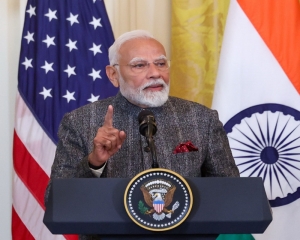Constant comparison overshadows cooperation, empathy and joy of life
All of us, whether we like it or not, have to compete from the time we are born until the time we die. Though most of us indulge in healthy competition all the time, nevertheless, one thing common to all kinds of competitions is the underlying desire to win a victory for the self or to defeat others. While competing, a person brings out their skill, ability, art, acumen, or talent to show that they are superior, stronger, better, more powerful, more skilful, more learned, or more competent than others. It is this habit of making comparisons with others that creates the competition background.
That is why we always see this subtle desire in people who are winners, to hear some words of praise about themselves or their performance. To fulfil this ultimate objective of massaging their egos, one does not care if the other person feels disappointed, depressed, defeated and even humiliated, ridiculed, or booed. This drive to be recognised as “better” than others sometimes overshadows the simple joy of participating or improving oneself. To understand this kind of behaviour, one needs to understand human psychology because the roots of comparison and competition have been sown into our minds since our childhood days.
From school grades to sibling rivalries, we are conditioned early to pit our success against others’ failures. Hence, they become more rigid with time. We need to understand that the core objective behind the competition is not simply the desire to win, but it is intertwined with the motive of laying aside the softer and nobler sentiments of cooperation, kindness, and gentleness, even if only for a while. In competition, one puts all energies and talents into bogging down or defeating another person, leaving them behind in the race while making a forward thrust to reach the goal before anyone else. As the famous philosopher Schopenhauer said, “The world is a battle of will and intellect.” But in this battle, one often loses sight of empathy and connectedness, which are essential for human growth.
It may also put a limit on one’s spirit of giving, helping, cooperating and sacrificing. Remember! Anything small and insignificant in the beginning has the potential to grow and become big. Hence, we must not forget that even though a spark or flame of fire may be small to start with, it can reduce a big apartment with valuables to ashes if it grows into a big fire. Thus, we should be careful and vigilant, because if the whole society catches this contagion or infection of selfishness or rivalry, it may spoil the charm of life and the atmosphere in society. Some people link competition to motivation and developing an attitude toward high performance. But they fail to understand that this evil trait to defeat others, which may look like a harmless thing initially, may eventually develop into a spirit of revenge, feelings of hatred or enmity, bitter jealousy, confrontation, hostile attitudes and ugly outbursts. These effects are not limited to the individuals involved but spill over into communities, organisations and even nations. Look at global politics or corporate boardrooms, and you will see this principle at play on a massive scale. Hence, it all depends upon the emotional maturity of a person whether or not he or she is affected. Because this seed of evil, as it grows, takes the form of a big tree with many branches; so, too, does selfishness or the spirit to downgrade others to gain ascendance for the self. It may proliferate into many evils or obnoxious habits. Hence, one must try to curtail selfishness and give up the ambition of winning by vengeance for the applause and praise of the self. Remember! The only competition that should matter to us is the one that takes place within ourselves. Hence, it is better to defeat one’s inner demons first and become victorious from within to be an example for others to follow.
(The writer is a spiritual educator & popular columnist; views are personal)



























